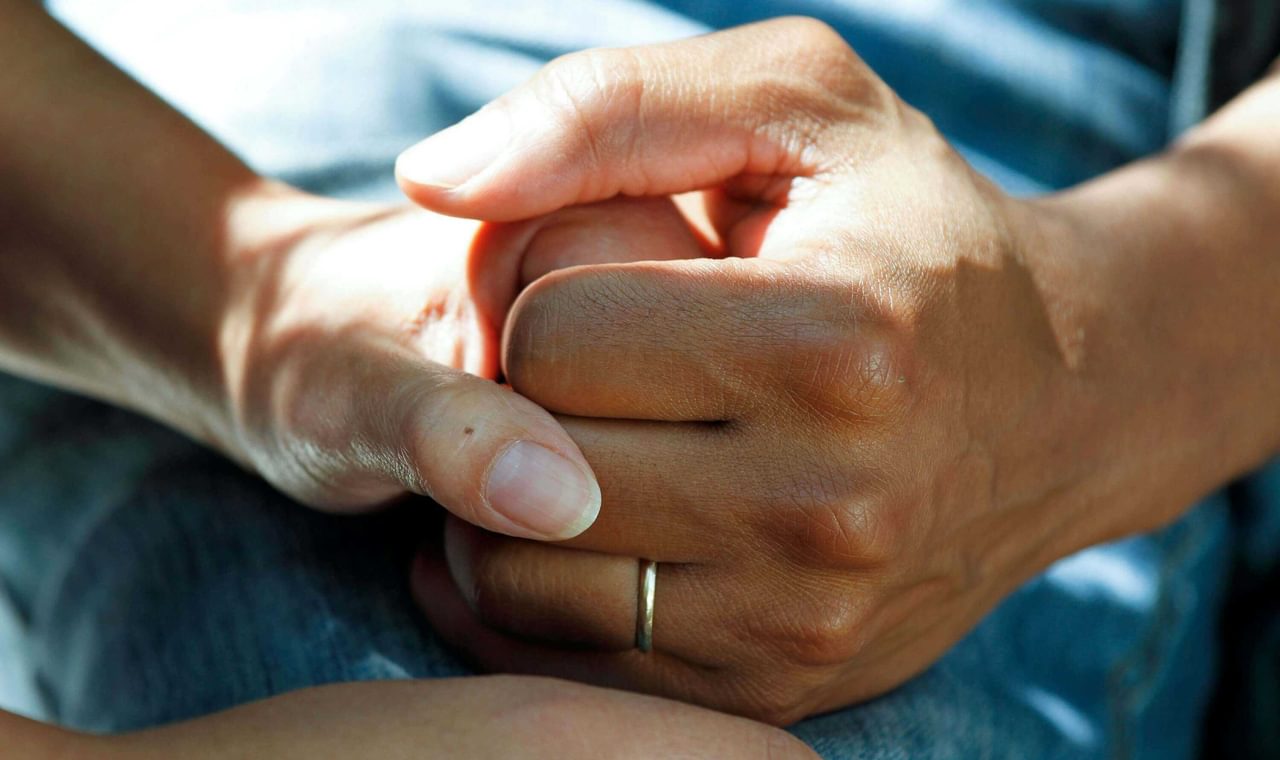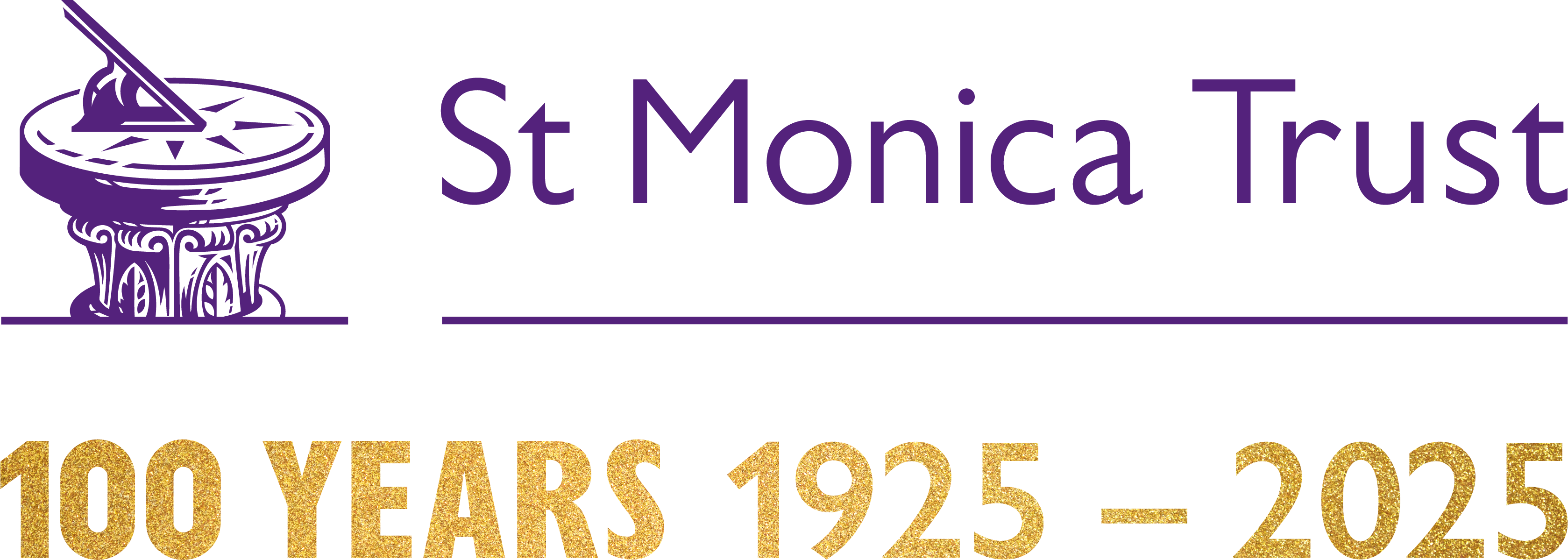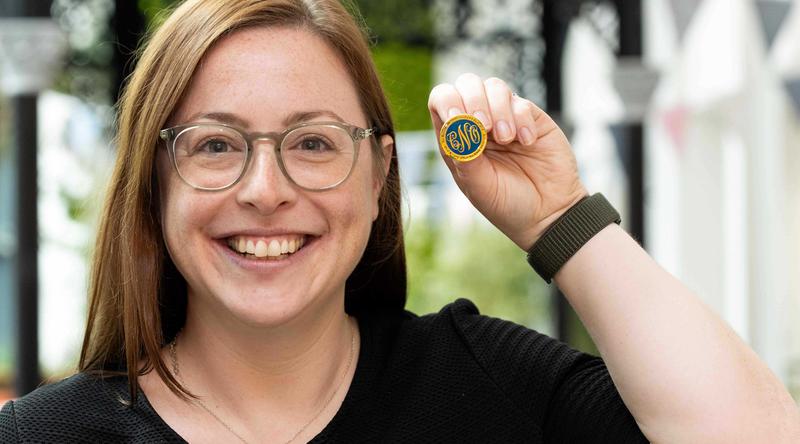
Nurses in the spotlight
To celebrate nurses, we are shining the spotlight on two very special women who are nurses from different generations.
Jill Cownie was a nurse for more than forty years after starting her career in 1952, and has a family connection to the UK's most famous nurse, Florence Nightingale. Now 90 years old, she is a resident at the Trust's Westbury Fields Retirement Village.
Emily Pimm, a nurse at St Monica Trust, is this year's Lamp Carrier at the Florence Nightingale Foundation Commemorative Service. Emily shares her thoughts on being the first social nurse to receive this honour and her journey in nursing.
Jill Cownie
Jill Cownie is a resident at the Trust’s Westbury Fields Retirement Village. A nurse for more than forty years, she has a family connection to the UK’s most famous nurse, Florence Nightingale. Jill’s Great Grandfather, Henry Bonham-Carter was Florence Nightingale’s first cousin and worked with her closely to further the cause of nursing reform. Now 90 years old, Jill describes herself as: “Fit, happy and healthy – just as it should be!”

Why did you become a nurse?
I never thought of doing anything else. From a toddler’s age up I was always going to be a nurse and never thought of going any place other than St Thomas’ Hospital in London. It was Florence Nightingale’s hospital and opposite the Houses of Parliament on the river bank. It’s been rebuilt now, but the original building was based on Florence Nightingale’s plan.
When did you start your nursing career?
I started in October 1952 and loved it! We did three months in an old house in Godalming where we learnt the basics – how to make a bed, take temperatures etc. From there we went to a nice block of flats across the Thames from Battersea Power Station and went by bus to the hospital each day.
We worked a five-and-a-half day week and were called probationers. We wore very boring purple and white striped dresses, and did all the dirty work in the sluice, emptying bed pans and rubbing people’s backsides to stop them getting bed stores. I don’t suppose that happens now!
We did that for the first six to nine months and then when probation was over we got a black leather belt. That was big step up and then we started doing more nursing. It was very hands-on in those days. We learnt how to look after people and you learnt the skills as you went along.
What happened after you qualified?
It was three years from probationer, to black belt, to doing your state exams and qualifying as a state registered nurse. Then you had a white belt and started being in charge of wards on different shifts.
Every three months you were assigned to a specific ward. I did medical female, medical male, surgical female, surgical male, eye ward, chest ward and casualty ward. There were also two children’s wards. The aim was to get you all-round experience as a nurse.
I also did three months at a hospital in Godalming. I was in theatres down there and realised it was something I really enjoyed. When I went back to London, I went on night duty doing theatres and decided that was what I was going to do for the rest of my career.
What are your memories of working at St Thomas’?
<Laughs> I’ve never had a good memory. The worst thing for me was that wards were fifteen people on either side with two in the middle if the ward was over-full. There would be three nurses on duty overnight for thirty people.
Once you were on that ward you were on it for three months and the first week was a nightmare. The night sister would come round and you’d meet her at the door. You would then be expected to be able to walk around the ward to each bed and tell her the name of the patient, what they’d had done to them and whether they’d been to the loo. There were no charts at the end of bed and you were supposed to have memorised everything in the three hours you’d been on.
St Thomas’ Hospital taught us to manage unexpected situations and the emphasis was always on the patient. Black stockings and laced black shoes were compulsory. Absolutely no make-up or any jewelry ever - not even ear rings! Hair was kept short or tidily tied back - never long and flopping around. One never used a Christian name for oneself and certainly never for a patient. I remember a patient failing to wake up following an anesthetic and the nurse with him kept speaking to him by his Christian name. I suggested try, “Mr…” and he woke immediately!
Where did you go after St Thomas’?
I nursed in a hospital in St Albans when I first got married, which was very different because it was a provincial hospital. I learnt a lot there, but stopped when I became pregnant. We had three sons and when the youngest was six, I went to the Royal Infirmary in Derby and worked in theatres again. I had a couple of opportunities to progress up and do theatre management or become a ward sister, but I didn’t want to walk around with a book on my arm – I wanted to be with my patients, so theatre was ideal for me.
It wasn’t unusual to go back after having children. Society was beginning to realise that women were worthwhile and useful! In the 1930s it wasn’t the done thing, but that changed after war. I was lucky because nurses with theatres experience were always in demand. I worked three days a week, had a leave of absence for the school holidays and worked at Derby Royal Infirmary until 60, then retired.
Would you recommend nursing as a career?
Nursing is a fulfilling career. It’s with you for life and never leaves you - you’re always a nurse! It isn’t all thermometers, bandages, injections and things. It’s about making relationships with your patients, so they have the confidence that you’re really going to look after them.
I think that’s why I liked the theatres. Patients come from the ward in a bed or trolley into a separate anaesthetic room and the nurse would be there to greet them. I loved doing that. There’s this poor, terrified person who has left their comfortable ward and is entering theatre where they know nasty things are going happen. You’ve only got five minutes to convince them that they’re in good hands, you’re going to look after them, that you know what you’re doing, that everything’s fine and you’ll be there when they wake up at end. Being able to put someone at ease and get to know them in only five minutes is a very rewarding thing to achieve.

Emily Pimm
What is your current role and how long have you been with the Trust?
I’m the Social Care Deputy Manager at John Wills House and I’ve been with the Trust for eight-and-a-half years. My role gives me an oversight of the social care provision at the care home, which thinks about how we care for a person as a whole and how best to meet their needs. This includes line management of the House Leads and care colleagues, as well as providing the direction of service for the home’s well-being coordinators, pastoral care and volunteers.

Why did you become a nurse and when did you qualify?
When I was seventeen, my dad had cancer and throughout his treatment I would be hounding the nurses, asking them lots of questions. I always wanted to understand more and seeing the amazing treatment that my dad had, I was really keen to start nursing as my career. I started out in dental nursing, began my nurse training in 2003 and qualified as a nurse in 2006.
Why social care nursing?
I spent lot of time after I qualified as a nurse testing the waters and seeing what area of care I wanted to work in. I worked in a prison, in disability assessment and lots of other different areas of care. I then had the opportunity to work in a care home as deputy manager with another organisation and have never looked back.
What do you enjoy most about social care nursing?
What I really love is being able to make a difference to people’s lives and having the chance to get to know our residents really well. I feel very passionate about advocating for older people and being able to shift people’s thinking to consider the whole person and what it is they need. Nursing older people is a real skill – a calling - and I really enjoy ensuring that our residents have the opportunity to connect with their community, live the life they want to live and be the person the want to be.
How did you come to be a Lamp Carrier at the Florence Nightingale Foundation Commemorative Service?
I was awarded a Florence Nightingale Foundation Leadership Scholarship in 2022. Each year they host a commemorative service in Westminster Abbey to celebrate the work of nurses and midwives across the UK. After the scholarship, I went through a programme to become the Chair of the Social Care Nursing Advisory Councils and have been proactive in spreading the learnings I’ve taken from the Florence Nightingale Foundation. It’s my understanding that a panel meets each year to consider who carries the lamp and I was very lucky to receive an invite to be the Lamp Carrier.
How does it feel to be the first social care nurse to be chosen as the lamp carrier?
I feel very proud. There are thousands of amazing nurses out there, but social care is not always at the forefront of people’s minds when thinking about career pathways or educational development. Being the Lamp Carrier is a real opportunity to build on all the work being done to promote the care sector to nurses and I feel very honoured for the opportunity to be a part of that.
How has Trust supported you?
John Wills House Care Home Manger, Wendy Leaman has been really supportive of all the different roles and work I’m doing. I do a lot of this work in my own time and Wendy has given me the flexibility to do that, when required. My learnings and insights from the leadership programme have really influenced the direction of how I work at John Wills House in terms of the social care provision. It’s also enabled me to feed into all the contacts I’ve made and use that to influence the thinking about how we build on our nursing and social care provision.
Any advice for anyone considering a career as a social care nurse?
Do it! It is a wonderful sector to work in and you get to work with amazing people. You can achieve great job satisfaction from having real value to your day and being able to make a difference to people’s lives.



